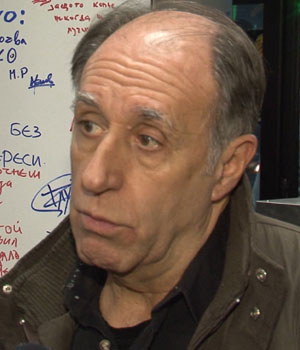This week, on January 13 we mark the Day of Bulgarian cinema. In 2017 Bulgaria also marks the 10th anniversary since this country was welcomed to the European Union. What has changed in the art of cinema during this decade? More from cinema expert prof. Bozhidar Manov:
 "With Bulgaria’s entry into the EU it became a full member of some of the largest European funds for culture and in particular the Eurimages Cinema Support Fund and the" Creative Europe" program. This membership allows for participation in European co-productions that receive serious financial funding. There are other mechanisms for supporting the distribution of European films in Bulgaria and Bulgarian movies across Europe. This facilitates the exchange of European movies that aim at the artistic effect, confronting with mainstream commercial American cinema. These funds have provided aid for educational programs in which filmmakers from different areas receive additional training," professor Manov says and adds:
"With Bulgaria’s entry into the EU it became a full member of some of the largest European funds for culture and in particular the Eurimages Cinema Support Fund and the" Creative Europe" program. This membership allows for participation in European co-productions that receive serious financial funding. There are other mechanisms for supporting the distribution of European films in Bulgaria and Bulgarian movies across Europe. This facilitates the exchange of European movies that aim at the artistic effect, confronting with mainstream commercial American cinema. These funds have provided aid for educational programs in which filmmakers from different areas receive additional training," professor Manov says and adds:
“Another line of cooperation and integration with our European partners is building a network of cinema halls. Film distribution is seriously hampered by absence of cinema halls. Most of them are situated in shopping malls but mall culture is in contradiction to arthouse cinema. That is why the program of Europe Cinemas focuses on creating a network of several thousand cinemas for distribution of non-commercial European films. They receive special funding. In Bulgaria, Dom na Kinoto and Lumiere Cinema in Sofia are examples of such cinema halls. The Europe Hall in the Varna Festival and Congress Centre is also part of this European network for non-commercial cinema.”
The aim is to strengthen European film culture that competes with the mighty commercial film business from across the ocean, Bozhidar Manov says and adds:
"These programs are a strategic project that allows European cinema, supported by governments and international funds, to preserve its identity. Actually, Bulgaria is quite active in establishing such contacts through the National Film Centre, as well as private producers. Every year some interesting co-productions are realised. In some of them this country is the major producer and leading artistic force. In other cases, we have a minor role, assisting with part of the budget for some tripartite co-productions. As a result Bulgaria has its place on the European cinema map and at major European festivals. I wish Bulgaria was more often a major producer, but currently finances are limited.”
We'll add that last year we had the opportunity to see the co-production "The prosecutor, defender, the father and his son" written and directed by Iglika Trifonova. This country is involved in other co-productions that are part of European film distribution. Director Milko Lazarov has been working on an interesting project entitled "Nanuk", in which Bulgaria is a leading creative and financial force.
"We have successes in documentary film co-productions, as well, mainly through Bulgarian film company ‘Agitprop’. It has become common for Bulgarian full-length documentaries to win prestigious awards at festivals and to be shown in European cinemas. This is a brief summary of the actual, visible, concrete results, stemming from this integration that we could not achieve before, as we did not meet a number of rules and regulations for participation in EU co-financing. We now have equal rights."
English: Alexander Markov
Days of Bulgarian culture will be organized in Madrid between November 9 and December 31, 2024, BTA reported, citing Latinka Hinkova, president of the Association of Bulgarians and Artists "TREBOL" and head of two Bulgarian Sunday schools in Torrejon de..
The national awakeners of Bulgaria are the individuals for whom we feel not only gratitude and admiration, but also perceive as some of the most significant figures in our history, because they awaken our sense of national togetherness. However, what is..
People with mental disabilities will share their unique perspective on Sofia's architectural heritage in the photographic exhibition "Architectural Stories from Old Sofia". It will be opened on November 1 in the Cultural Space of the Central Sofia Market..

+359 2 9336 661
